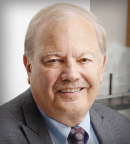The addition of the CDK4/6 inhibitor ribociclib to endocrine therapy significantly improved invasive disease–free survival in women with hormone receptor–positive, HER2-negative, early-stage breast cancer. These results of the phase III NATALEE trial were reported by lead author Dennis J. Slamon, MD, PhD, Director of Clinical/Translational Research and Director of the Revlon/UCLA Women’s Cancer Research Program at the UCLA Jonsson Comprehensive Cancer Center, at the 2023 ASCO Annual Meeting.1 Of note, NATALEE included patients with node-negative and node-positive, early-stage breast cancer, unlike other recent trials in the adjuvant setting.

Dennis J. Slamon, MD, PhD
At the second efficacy analysis of this large phase III study, the addition of ribociclib reduced the risk of invasive recurrence by 25%. The 3-year rate of invasive disease–free survival was 90.4% with ribociclib vs 87.1% with hormonal therapy alone.
“NATALEE met its primary endpoint, and this was true in all subgroups. The study utilized a 3-year regimen of ribociclib at a 400-mg starting dose in the adjuvant setting. These data support ribociclib plus endocrine therapy as a new treatment of choice in a broad population of patients with stage II or III early breast cancer at risk of recurrence, including those with cancer that has not spread to the lymph nodes,” said Dr. Slamon.
Background
Hormone receptor–positive, HER2-negative breast cancer accounts for up to 70% of all early-stage cases of breast cancer in the United States. The current standard of care for patients with this type of cancer is surgery with or without chemotherapy or radiation therapy followed by 5 to 10 years of endocrine therapy.
“About one-third of stage II and half of stage III early breast cancers will recur. Treatment for these patients represents an unmet need,” Dr. Slamon said.
CDK4/6 inhibitors (abemaciclib, palbociclib, and ribociclib) are used to treat metastatic hormone receptor–positive, HER2-negative breast cancer. Studies in the adjuvant setting have shown no benefit for palbociclib added to endocrine therapy for early-stage breast cancer. However, abemaciclib has been effective in node-positive, early-stage disease. NATALEE is testing ribociclib in the early-stage breast cancer setting in both node-positive and node-negative patients.
NATALEE differs from other adjuvant studies of CDK4/6 inhibitors in three ways. First, it includes a broader population of patients with stage II and III early-stage breast cancer, enrolling a proportion of patients with no nodal involvement. Second, the study used a 400-mg dose of ribociclib, which is lower than that approved in metastatic disease (600 mg/d for 3 weeks with 1 week off per cycle). Third, NATALEE treated patients with ribociclib for 3 years.
“We were attempting to improve tolerability while maintaining efficacy, based on the observation that efficacy was maintained in patients with metastatic disease on lower doses of CDK4/6 inhibitors. -NATALEE is the only adjuvant study that treated patients for 3 years [with a CDK4/6 inhibitor] rather than 2 years,” Dr. Slamon said.
Study Details
Patients with stage II or III hormone receptor–positive, HER2-negative, early-stage breast cancer at risk for recurrence were randomly assigned 1:1 to receive either adjuvant ribociclib for 3 years plus hormonal therapy for at least 5 years (n = 2,549) or hormonal therapy alone (n = 2,552).
At a median follow-up of 34 months, 20.2% of those treated with ribociclib completed 3 years of treatment, and 56.8% had completed 2 years of treatment. About 75% of all participants remained on study treatment at data cutoff, with 1,984 patients receiving ribociclib and 1,826 receiving hormonal therapy alone. The median duration of follow-up for invasive disease–free survival was 27.7 months for both arms of the study.
Key Findings
At the second efficacy analysis, there was a 25% relative reduction in the risk of invasive breast cancer, and the benefit was seen across all subgroups, regardless of disease stage, menopausal status, or nodal status. Ribociclib also achieved more favorable outcomes in overall survival, recurrence-free survival, and distant disease–free survival.
“Safety is an equally important endpoint,” Dr. Slamon noted. The most common adverse events associated with ribociclib were neutropenia (“a class effect,” he said) and joint pain. For those receiving hormonal therapy alone, the most common adverse events were joint pain and hot flashes.
MORE INFORMATION
For more on the findings from the phase III NATALEE trial of ribociclib plus endocrine therapy for early-stage breast cancer, see a joint interview with Lisa A. Carey, MD, and Dennis J. Slamon, MD, PhD, on The ASCO Post Newsreels at ascopost.com/videos.
QT prolongation has been a concern with CDK4/6 inhibitors. “Using a reduced dose of ribociclib improved safety signals regarding QT prolongation,” commented Dr. Slamon. In the advanced-stage breast cancer setting, the incidence of all-grade QRS prolongation was 74% when patients received 600 mg of ribociclib, and this decreased to 62% with the 400-mg dose.
“It will be important to follow these patients long term to see which patients need additional therapy and which do well with endocrine therapy alone. Having a choice among CDK4/6 inhibitors in early breast cancer is great for patients and oncologists,” commented Julie R. Gralow, MD, FACP, FASCO, Chief Medical Officer and Executive Vice President of ASCO, who moderated a premeeting press briefing where these data were discussed.
DISCLOSURE: Dr. Slamon has served in a leadership role for 1200 Pharma, Biomarin, and Torl Biotherapeutics; has stock and other ownership interests in Amgen, BioMarin, Merck Sharp & Dohme, Pfizer, Seagen, and Vertex; has received honoraria from Novartis; has served as a consultant or advisor to Eli Lilly, Novartis, Pfizer, and Seagen; has received research funding from Novartis and Pfizer; and has received reimbursement for travel, accommodations, and expenses from Biomarin, Novartis, and Pfizer. Dr. Gralow reported no conflicts of interest.
REFERENCE
1. Slamon DJ, Stroyakovskiy D, Yardley DA, et al: Ribociclib and endocrine therapy as adjuvant treatment in patients with HR+/HER2– early breast cancer. 2023 ASCO Meeting. Abstract LBA500. Presented June 2, 2023.

